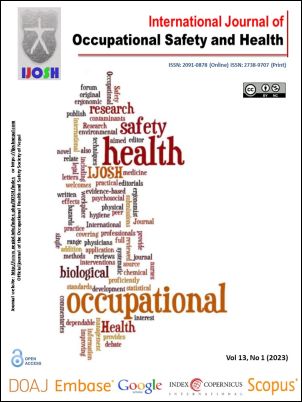Solid waste workers in India and the COVID-19 pandemic: A Review of Intersecting challenges
DOI:
https://doi.org/10.3126/ijosh.v13i1.43113Keywords:
Solid waste workers, COVID-19, health, occupation, morbidities, protective equipment, discrimination, IndiaAbstract
Introduction: Municipal garbage/refuse, sludge, industrial and commercial waste, etc. is termed Solid Waste (SW) and those who handle such waste are SW workers. But the COVID-19 pandemic has hit them hard. SW workers play a vital role in waste management to safeguard and promote public health. But they are often unappreciated and the various health risks and vulnerabilities associated with waste handling are overlooked. This study aimed to review the working conditions and morbidities of SW workers highlighting the longstanding challenges before and after the onset of COVID-19 in India.
Methods: Databases such as PubMed and Google Scholar were used for the inclusion of articles. Drawing from the literature on the working conditions and morbidities of SW workers in India alongside grey literature and news reports by electronic media during the pandemic, this paper highlights the longstanding challenges of SW workers.
Results: The health morbidities and structural challenges due to caste, and class that were reported as being faced by SW workers across the studies have worsened at the onset of COVID-19. There is a multiplying effect of their vulnerability due to the disadvantages of caste and class. Due to power dynamics, they were forced to work without proper wages and appropriate healthcare resources. Many incidents across the country reported stigma and discrimination; poor access and utilization of Personal Protective Equipment (PPE) among SW workers resulted in infections and deaths due to the pandemic. Lack of proper data on COVID-19 infected SW workers; lack of proper certification had halted their insurance claims.
Conclusion: This paper noted the multiplying effect of long-standing vulnerabilities that were exposed during the pandemic. Proper maintenance of health records and a sustainable employee grievance redressal mechanism are essential. The need of the hour is to focus on strategies to improve their working conditions along with policies to protect their dignity and empower them.
Downloads
Downloads
Published
How to Cite
Issue
Section
License
Copyright (c) 2023 K.L. Ramitha

This work is licensed under a Creative Commons Attribution-NonCommercial 4.0 International License.
This license enables reusers to distribute, remix, adapt, and build upon the material in any medium or format for noncommercial purposes only, and only so long as attribution is given to the creator.





